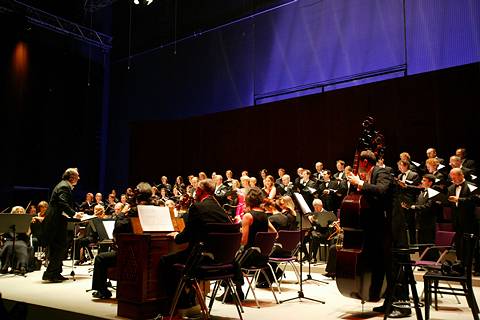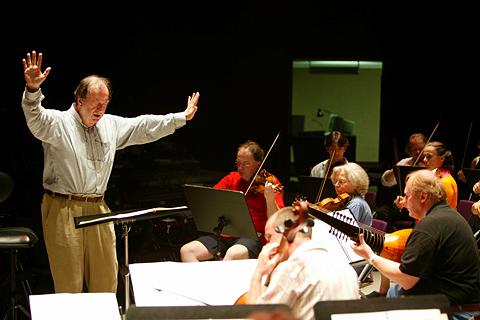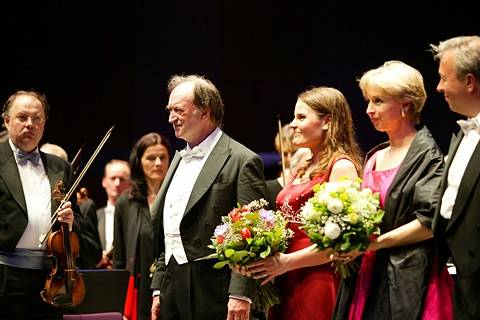|
<< -- 5 -- Rex Harley DAY OF JUDGMENT

Paradoxically, the subtlety of Telemann's writing also benefited from this high octane approach. In the first chorus of the Second Reflection, out of the 'roar, like the clatter of loudly rumbling carriages,' when Jesus 'borne on lightning, travels hither to judge the world', comes a phrase, passed almost pianissimo along the ranks of the chorus, from soprano through to bass: zerreissen die Welten und sind nicht mehr. ('Worlds shatter and are no more'). It has already been sung twice, with the force one would expect. But this third time it is suddenly both beautiful and more terrifying in its understatement; even more so when you can see what is happening in front of you.
The visual aspect also played its part at the start of the Third Reflection, when the three horns, representing the final trump, came in from the back and took their seats in the orchestra! After the last trump has sounded the alto, as Devotion, announces, in awed tones: Er winket -- das Gericht hebt an. ('He gives the signal -- the Judgment begins.') There follow probably the most memorable passages in the whole piece.

Nikolaus Harnoncourt with soloists, choir and orchestra. Photo © Harry Schiffer
|
First Jesus addresses the believers, in an aria of great beauty, accompanied by an oboe d'amore. Thomas Mohr, the confident sceptic of the First Reflection, demonstrated his versatility by employing a different voice altogether: higher register, legato phrasing; minumium vibrato. Then the choir of believers delivers a chorale, the words taken from Luther's translation of the Te Deum, in an archaic setting, harmonically reminiscent of Praetorius. Again, Harnoncourt found a way of drawing one further into both music and text, simply by emphasising the pauses between each line. It's a technique still used in certain religious houses for the recitation of the psalms, designed for the congregation not merely to speak but also to ponder the words, and entirely apposite for this liturgical moment. And, incidentally, it allowed us to appreciate the sheer beauty and tonal integration of the Arnold Schoenberg Choir. The contrast with the following recitative -- Unbelief now represented by the tenor -- could not be more extreme, and Herbert Lippert's delivery of Flieht, ach, flieht zurück! ('Fly! Ah, fly back!') saw him almost hyperventilating with terror. And so the scene builds until Jesus has condemned the godless to hell and the Fourth Reflection begins.
Schallt, ihr hohen Jubellieder!
('Ring out, ye sons of jubilation!')

Nikolaus Harnoncourt and members of the orchestra. Photo © Harry Schiffer
|
And ring out it certainly did. First the trumpets, then the chorus, then soloists, the phrase rising through the alto to the soprano -- Genia Kühmeier's top A Flat
resounding just long enough in the perfect acoustics of the Helmut-List-Halle. The highlight of this final section, however, had to be the tenor arioso. Herbert Lippert, in perhaps the most dramatic role-change in the whole piece, left Unbelief behind in order to articulate the joys of a Blessed Soul. Accompanied only by organ continuo, Baroque lute, cello and gamba, his phrasing in the upper vocal registers was effortlessly expressive; the gamba solo, taken by Herwig Tachesi added a plaintiveness which even the best cello playing could not have achieved. Finally, the glorious chorus of the heavenly choirs sing a hymn of thanksgiving that positively dances with joy. And Harnoncourt finished as he had begun, emphasising the sudden shifts in rhythm by which Telemann creates the wonderful swaying effect of this chorus.

Nikolaus Harnoncourt and soloists. Photo © Harry Schiffer
|
I lost count of the number of times the performers were called back to the stage. It had been an evening of the most triumphant music-making. My great wish is that these forces can be coaxed abroad so that others, in non-German-speaking countries can discover at first hand what they've been missing!
|

